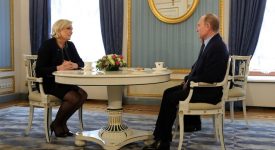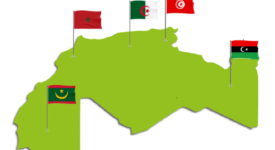In the last two decades, discussions of North African integration have evoked ideas of a shared identity and a common destiny in the region. However, recent attempts to build regional blocs in North Africa, including the Arab Maghreb Union established in 1989, have been unsuccessful and remain firmly in the public consciousness. Discussions on integration have failed to overcome existing challenges that have so far thwarted attempts at North African integration. These challenges are likely to continue to frustrate any efforts at deepening political, economic, financial and social relations between the countries of the region.
North African integration is not a new idea. However, countries in the region have so far struggled to form a cohesive bloc with deep political, economic and social ties. Political instability has effectively deprioritized North African integration. A focus on thematic (political, economic and security) ‘synergies’ may provide a better framework for cooperation than seeking opportunities for all-encompassing ‘deep’ and ‘comprehensive’ integration. Governments of North Africa dedicate considerable resources to domestic security but much of their efforts are conducted at the national level and directed towards threats from terrorists, insurgents and militias.
Improved security cooperation would achieve better outcomes and economies of scale, including efforts to tackle human trafficking. A new generation of jihadis has emerged in North Africa since 2011. Nearly 27% of the 30,000 fighters who travelled to Syria are from the Maghreb. While government counterterrorism operations have been effective, countries have failed to address the root causes of radicalization. Meanwhile, border economies have suffered as a consequence of a security focus on terrorism and smuggling, which has rendered many previously accepted cross-border trade activities illegal.
States have struggled to provide alternative livelihoods for those who have lost this source of income. Border forces tend to lack the right combination of capacity, training and equipment to secure borders and often resort to heavy-handed tactics. On a separate but related matter, new thinking is required to develop a more human-centric and proactive approach to migration issues in the region, which continues to witness huge flows of migrants. The migration policy of Morocco, introduced through legislation in 2014, could be a model for North Africa.
The countries of North Africa have varying economic profiles, ranging from economically diverse Morocco to oil-and-gas-dependant Libya. However, they all face similar challenges including unemployment (particularly among the young), poor public-service delivery, low FDI levels, an oversized public sector, ineffective tax collection, and high informality. Fostering entrepreneurship and the development of small and medium-sized enterprises (SMEs) are priorities for North African countries, particularly regarding job creation. Regulatory cooperation – such as harmonizing SME definitions, legislation and support institutions – across North Africa is an obvious area where further integration would encourage the development of start-ups and small businesses.
With the advent of the fourth industrial revolution, North African governments must address their technological gaps and work to improve public–private cooperation. In some sectors, such as the fintech industry, North African countries can build upon nascent synergies that have developed organically, such as those of start-up incubators and angel investors that work across the region. Moreover, renewables, particularly solar energy production, are a promising development for North Africa. While regional initiatives, such as Desertec, have stalled due to political differences between countries, the sector has witnessed exponential growth in Tunisia, Egypt and Morocco, where the involvement of the private sector has proved successful.
North African countries tend to operate in silos – particularly regarding their security responses and economic planning – often opting to look outside of the region for a solution to a problem before considering working with their neighbours. While the five countries in the region differ in their approach to various challenges, there are also a number of occasions where they follow noticeably similar policies, which could be the basis for greater cooperation. Engaged outside parties, such as the UK and the EU, can play an important supporting role in encouraging cooperation.
For example, North African countries could develop synergies on security at the level of countering violent extremism (CVE) through more regional security cooperation, religious reforms and deradicalization programmes. Striking a balance between civil society-led action and state-led initiatives is an important element in designing comprehensive policies for CVE across the region. Such a concerted approach would also encourage the countries to share their learning experiences and help their neighbours avoid policy pitfalls, such as the fact that an over-reliance on security measures has weakened non-security attempts to tackle CVE. And cooperation is even more necessary with respect to complex challenges that require a holistic approach, such as smuggling and human trafficking.
North Africa’s diverse economic development and sectoral preference can be used to tailor new collaboration approaches. Regional value chains – essentially production systems from input provision to commercialization that spread beyond national borders – can allow countries to identify and exploit complementarity in their activities. By considering their economies’ different needs, resources and levels of access, North African countries can coordinate incentives, shared infrastructure development and services for particular sectors to develop the existing production capacity in the region and serve global markets. The automotive and solar energy industries are prime candidates for this. Foreign partners can also contribute to the elaboration of economic policies in specific areas drawing on the positive and negative experiences of governments in the region.
‚Synergy in North Africa: Furthering Cooperation‘ – Research Paper by Mohamed El Dahshan and Mohammed Masbah – Chatham House / The Royal Institute of International Affairs.







